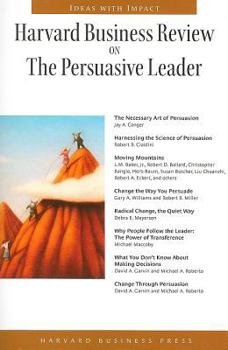Harvard Business Review on the Persuasive Leader
Select Format
Select Condition 
Book Overview
More companies are shifting from command-and-control hierarchies to flat management structures. To get work done through others under these conditions (your central job as a manager), you need to... This description may be from another edition of this product.
Format:Paperback
Language:English
ISBN:1422124991
ISBN13:9781422124994
Release Date:April 2008
Publisher:Harvard Business Review Press
Length:205 Pages
Weight:0.50 lbs.
Dimensions:0.6" x 5.6" x 8.3"
Customer Reviews
1 rating
Without trust and respect, there will be no credibility...and no one to persuade
Published by Thriftbooks.com User , 14 years ago
This is one of the volumes in the "Ideas with Impact" series, each of whose articles originally appeared in an issue of the Harvard Business Review. In this instance, in issues from May/June 1998 to February 2005; their subject is the Persuasive Leader. As the editors correctly point out, "Companies are moving from traditional command-and-control hierarchies to flatter management styles at a rapid pace. To work effectively in these organizations, you need to excel at persuading others - including those over whom you have no formal authority. [In this volume] you'll discover techniques to hone your persuasive powers and get people to give their best every time." All of the eight articles were written or co-authored by experts on this specific business subject. Here in Dallas near the downtown area, there is a Farmers Market at which several of the merchants offer a slice of fresh fruit as a sample of their wares. In that spirit, I now offer a sequence of brief excerpts that will, I hope, indicate the "taste" as well as the thrust of the ideas in the articles. From "The Necessary Art of Persuasion": "Effective persuasion involves four distinct and essential steps. First, effective persuaders establish credibility. Second, they frame their goals in a way that identifies common ground with those they intend to persuade. Third, they reinforce their positions using vivid language and compelling evidence. And fourth, they connect emotionally with their audience. As one of the most effective executives in our research commented, `The most valuable lesson I've learned about persuasion over the years is that there's just as much strategy in how you present your position as in the position itself. In fact, I'd say the strategy of presentation is the more critical.'" Jay A. Conger From "Harnessing the Science of Persuasion": "The other point I wish to emphasize is that the rules of ethics apply to the science of social influence just as they do to other technology. Not only is it ethically wrong to trick or trap tigers into assent, it's ill-advised in practical terms. Dishonest or high-pressure tactics work only in the shot run, if at all. Their long-term effects are malignant, especially within an organization, which can't function properly without a bedrock of trust and cooperation." Robert B. Cialdini From "Change the Way You Persuade": "Charismatics (25% of all the executives we interviewed) are easily enthralled by new ideas. They can absorb large amounts of information rapidly, and they tend to process the world visually...Thinkers (11%) are the most difficult decision makers to understand and consequently the toughest to persuade...Skeptics (19%) are highly suspicious of every single data point, especially any information that challenges their world view...Followers (36%) make decisions on how they've made similar choices in the past or on how other trusted executives have made them...Controllers (9%) abhor uncertainty and ambiguity, and they wil




